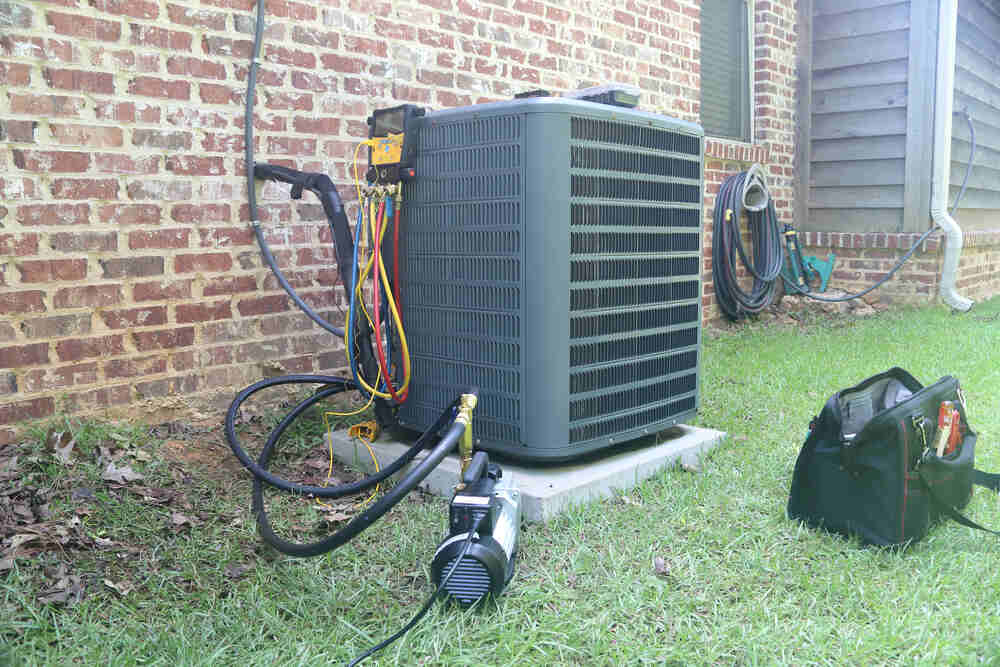Your HVAC system has one job, and it’s an important one: keeping your home or business cool and comfortable in the summer heat or warm and cozy in the winter cold. You rely on your air conditioner or furnace to keep you feeling your best, but what happens when that system stops performing as well as it should? One common cause of poor performance is a freon leak, which can weaken your AC unit over time and leave you vulnerable to major breakdowns that cost you more in the long run than simple repairs would have cost in the first place.

What is Freon?
Freon is a chemical compound containing carbon, fluorine, and chlorine. Commonly used as a refrigerant, it is known for its use in household appliances like air conditioners and refrigerators. However, if a freon leak develops in your HVAC system it can be very dangerous to you and your family’s health. Here are some of the symptoms that indicate that you might have a freon leak.
If you have an appliance that uses refrigerant, it’s important to know what to do if a freon leak develops. While refrigerant is safe when used as intended, it is not meant for human consumption and inhalation can lead to serious side effects. These include nausea, dizziness, drowsiness and unconsciousness. In addition, overexposure can lead to cardiac problems and even death. Fortunately, freon leaks are easy to fix with a professional technician. If you think you might have a leak then schedule an appointment with your service provider as soon as possible for a thorough checkup of your HVAC system so any issues can be diagnosed and treated before they cause significant damage or injury.
What happens when your AC unit has a leak?
It’s an unpleasant surprise. You walk into your living room on a hot day and are hit with a blast of cool air that smells like…rotten eggs? What’s going on? Did you leave a window open? As it turns out, your central air conditioner is leaking. It’s not just losing its coolant—the leak is causing nasty fumes to make their way into your home, as well. That odor is actually coming from a toxic chemical called freon. Unfortunately, freon isn’t typically something you can just pump back into your system or even clean up. Once it gets out, it usually stays out—and no one knows how long that will take or what damage it might cause in the meantime.
So what can you do? Calling a professional to fix your leak is a smart first step, but you also need to take action if there’s already freon in your home. The safest thing to do is open up all of your windows and let fresh air circulate through. Open vents as well, if you have them. This will clear out any remaining toxic fumes so that you can breathe easy again. And once it’s safe for your family, use fans and portable air conditioners (like window units) to stay cool instead of turning on your AC until you know it’s free from freon.
Warning Signs of an AC Leak
If you notice your air conditioner constantly running but still having trouble cooling down your house, it may be time to inspect for leaks. There are a few key warning signs of an air conditioning leak. These include: Confusing noises from your unit, such as hissing or banging. Vibrations from inside your home which can be particularly noticeable at night when everything is quiet. A unit which keeps turning off and on frequently, even though its set to a constant temperature. If any of these sounds or feelings occur while your air conditioner is running, it’s important to contact an HVAC professional right away! (More reasons not to ignore freon leaks here!)
Fortunately, most ac leaks aren’t hard to find if you know what to look for. You should always keep an eye out for warning signs that your system might be leaking freon, especially during hotter months of the year when a cold spot near your vents or equipment might mean there’s a problem with your ac unit. One easy way to tell if there’s a leak is by checking if moisture appears around vents and registers where tubing attaches. Condensation means there’s likely a leak – usually due to old seals being damaged.
Make An Appointment With An HVAC Specialist To Check For An AC Leak Today!
Just because you can’t see it doesn’t mean there isn’t a problem. Freon leaks are often invisible to homeowners, but that doesn’t mean they aren’t present. The longer an air conditioning leak is left untreated, and before it is diagnosed and fixed, larger problems can occur. It might be time to make an appointment with your HVAC technician today if
-Your bills have been unusually high lately.
-You hear hissing or popping sounds when your unit turns on or off.
-Your home feels warmer than usual during winter months or cooler than usual during summer months.
-Your unit seems louder than normal when running. -You notice unusual smells coming from your unit. These smells could indicate mold growth, which requires immediate attention from an HVAC specialist to prevent further damage and health risks for you and your family members.


